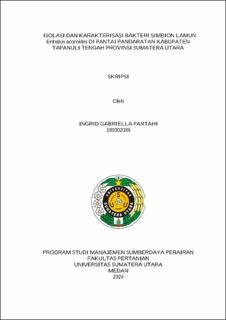| dc.description.abstract | Pandaratan Beach, Sibolga, is a coastal area that has an abundant diversity of natural resources, one of which is the seagrass Enhalus acoroides. It is known that seagrass contains symbiotic bacteria that live in symbiosis. This research aims to determine the character, type,growth rate and generation time of the symbiont bacterial isolates found on seagrass Enhalus acoroides on Pandaratan Beach, Central Tapanuli Regency, North Sumatra Province. This research was conducted in January - February2023 at Pandaaran Beach. In this research, quality testing was carried outwater was carried out directly in the field and bacterial identification was carried out in the FMIPA University of North Sumatra microbiology laboratory. Research result this shows that there were 7 genera of symbiont bacteria, namely the Micrococcus genus with 8 isolates, the Streptococcus genus with 1 isolate, the Lactobacillus genus with 2 isolates, the Bacillus genus with 2 isolates, the Klebsiella genus with 6 isolates, the Pseudomonas genus with 8 isolates, and the Photobacterium genus totaling 1 isolate. The Micrococcus genus has an average growth rate of 0.56 number of bacteria/minute, with an average generation time of 1.23 generations/minute. The Streptococcus genus has an average growth rate of 0.60 number of bacteria/minute, with an average generation time of 1.14 generations/minute. The Lactobacillus genus has an average growth rate of 0.60 bacteria/minute, with an average generation time of 1.13 generations/minute. The Bacillus genus has an average growth rate of 0.51 bacteria/minute, with an average generation time of 1.34 generations/minute. The Klebsiella genus has an average growth rate of 0.37 number of bacteria/minute, with an average generation time of 1.92 generations/minute. The Pseudomonas genus has an average growth rate of 0.58 bacteria/minute, with an average generation time of 1.18 generations/minute. The Photobacterium genus has an average growth rate of 0.36 bacteria/minute, with an average generation time of 1.96 generations/minute. | en_US |


